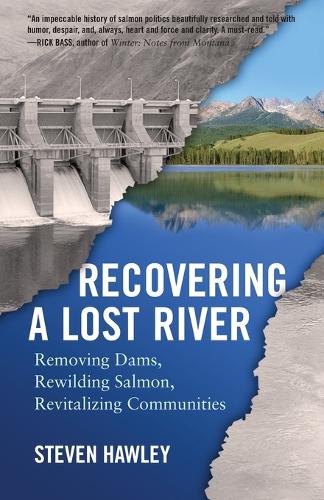
Recovering a Lost River: Removing Dams, Rewilding Salmon, Revitalizing Communities
(Paperback)
Publishing Details
Recovering a Lost River: Removing Dams, Rewilding Salmon, Revitalizing Communities
By (Author) Steven Hawley
Beacon Press
Beacon Press
1st September 2018
United States
Classifications
General
Non Fiction
Conservation of the environment
333.91621530973
Physical Properties
Paperback
280
Width 140mm, Height 215mm, Spine 14mm
331g
Description
A powerful argument for why dam removal makes good scientific, economic, and environmental sense--and requires our urgent attention The Snake River, flowing through the Northwest, was once one of the world's greatest salmon rivers. As recently as a hundred years ago, it retained some of its historic bounty with seven million fish coming home to spawn there. Now, due to damming for hydroelectricity over the past fifty years, the salmon population has dropped close to extinction. Efforts at salmon recovery, through fish ladders, hatcheries, and even trucking them over the dams, have failed. Hawley argues that the solution for the Snake River lies in dam removal, pitting the power authority and Army Corps of Engineers against a collection of conservationists, farmers, commercial and recreational fishermen, and the Nez Perce tribe. He also demonstrates the interconnectedness of the river's health to Orca whales in Puget Sound, local economies, fresh water rights, and energy independence. This regional battle has garnered national interest, and is part of a widespread river-restoration movement that stretches from Maine's Kennebec to California's Klamath. In one instance, Butte Creek salmon rebounded from a paltry fourteen fish to twenty thousand within just a few years of rewilding their river, showing the incredible resiliency of nature when given the slightest chance. In this timely book, Hawley shows how river restoration, with dam removal as its centerpiece, is not only virtuous ecological practice, but a growing social and economic enterprise.
Reviews
"[A] hopeful and blistering critique."Colleen Mondor, Booklist
An impeccable history of salmon politics beautifully researched and told with humor, despair, and, always, heart and force and clarity. A must-read.Rick Bass, author of Winter: Notes from Montana
After reading Hawleys very readable Recovering a Lost River, Im more convinced than ever that U.S. and Canadian government policy toward salmon and steelhead is to extirpate these pesky critters as they are in the way of greedy development, unnecessary dams, illegal profiteering, toxic fish farms, and more useless hatcheries.Yvon Chouinard, owner, Patagonia, Inc.
Hawley writes about the Columbia River Basin from every angle, talking to those whom other writers cant imagine or muster the courage to address. His style is surprisingly humorous for the subject, thought-provoking, truthful, and unpredictable. He gets it.Rebecca A. Miles, executive director, the Nez Perce tribe
Though there are echoes of some extraordinary authors in Recovering a Lost RiverHenry David Thoreau, Aldo Leopold, and Edward AbbeySteven Hawley writes with his own distinctly twenty-first century voice about the inherent value of wild rivers and the environmental and social degradation caused by dams. Read it and learnand act.Michael Baughman, author of A River Seen Right
Thanks to Hawleys meticulous research, we now have a new gold standard for banditry and shameless deception in private industry, state governments, and in the very federal agencies charged with safeguarding the biological integrity of our natural world. God help us.Paul VanDevelder, author of Savages and Scoundrels: The Untold Story of Americas Road to Empire through Indian Territory.
Very few writers have a sufficiently antic tone, an energetic enough intelligence, or a deep enough love to make enjoyable literature out of the ongoing federal crucifixion of the most important salmon river on this planet. Steven Hawley has found a perfect subject for his remarkable gifts.David James Duncan, author of The River Why
Both troubling and encouraging, a well-told tale of environmental activism and citizen action.Kirkus Reviews
Read Steven Hawleys book. Get out a map of America. Find this huge chunk of Idaho and eastern Oregon, through which a river named the Salmon winds, nearly all of it public lands that belong to us all. This is Noahs Ark for salmon. This time around Noah is us.Carl Pope, executive director, the Sierra Club
Author Bio
Steven Hawley is an environmental journalist whose work has appeared in High Country News, National Fisherman, OnEarth, and Missoula Independent. He lives with his family along the Columbia River.
